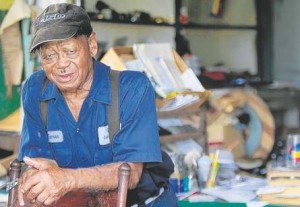Celebrating Living Memory
It is that time of year when many of us celebrate all of the ways that coming together brings us to face to face with our familial pasts, presents, and futures. These spaces, which may readily be filled with laughter and joy, can also invoke angst and anxiety. There are large populations of people for which the holidays are not at all happy times, and there are those, who, even in this moment, are in a place of mourning, lament, and sorrow.
I am grateful that I do not currently find myself in that particular space of familial distress. Rather, I am in Florida, the official Sunshine State, where I have the great privilege of grading finals while basking in the warmth of the sun—an admittedly needed change from the seasonally grey landscape that frequently hovers over our Massachusetts residence.
I am especially appreciative of being here at a time when we are celebrating and sharing in James Gordon’s life, my grandfather-in-law, who, at the age of 94, has had a few health setbacks. We have all rallied around him to show him, that, quite simply, he is loved by many. As we spend time in his home, observing the care he receives and taking part with helping out as best we can without getting in the way, I have been struck by the ways the stories by and about him are unfolding. I have been listening intently for how my family recalls his life, and watching how even as he seems to not quite have the strength he once had, his memories feel especially important at this moment.
James Gordon, Sr., “The Mayor of Rubonia”
image courtesy the Herald-Tribune Media Group
staff photo by Thomas Bender
The idea that memories have a feeling is certainly not new, and Karen E. Fields has given us a constructive way for thinking about how memory and storytelling work together to create an unfolding “topography” that is simultaneously visible and invisible. Her essay “What One Cannot Remember Mistakenly”[1] is a poignant example of what it means to wrestle with memory while the living remember.
Fields’s essay recounts her methodology of “recovering stories” while she co-wrote Lemon Swamp and Other Places: A Carolina Memoir (1985) with her grandmother Mamie Garvin Fields. “What One Cannot Remember Mistakenly” describes the ever-distinctive paradox of memory: that it simultaneously fails and succeeds. There is, as Fields often discovered in her time with her grandmother, the very real chance that what is being told might not be “true” in the historical record sense. This, however, does not mean that the story itself is irrelevant, and can (or should) be discarded because of its potential conflict with the “historical record.”
As writers (historians and otherwise) our efforts to “fact-check” and get the “real” story “right” often and mistakenly supersedes the importance of memory and remembering. The stories that are told are as important for what they reveal inasmuch as what they may veil. Put another way, we should not always be so hung up on what’s “right” inasmuch as we should pay attention to the importance of “inconsistencies” and “mistakes” that emerge in the act of recall. These discrepancies (so to speak) can derive as much from how those who remember (un)willingly forget as much as they come from our own inability to ask the questions that really matter to the people we talk to.
So I am trying my best to be a good historian and to ask the questions that matter. This has meant that I am spending as much time genuinely laughing at the timing of my grandfather-in-law’s punch lines as I am trying to find out if what he’s describing “actually” happened. I am doing my best, however, not to get too hung up on the details, as the art of the story is a story unto itself. I am actively celebrating living memory in action while I remember what Karen Fields aptly suggests: “For those of us who try to glean from personal testimony the movement of history, as well as history’s congealment in an order, what is interesting in the end is the ferment.”[2]
[1] Karen E. Fields, “What One Cannot Remember Mistakenly,” in History and Memory in African-American Culture, edited by Genevieve Fabre and Robert O’Meally (Oxford, 1994), 150-163.
[2] Fields, “What One Cannot Remember Mistakenly,” 160.
Copyright © AAIHS. May not be reprinted without permission.

